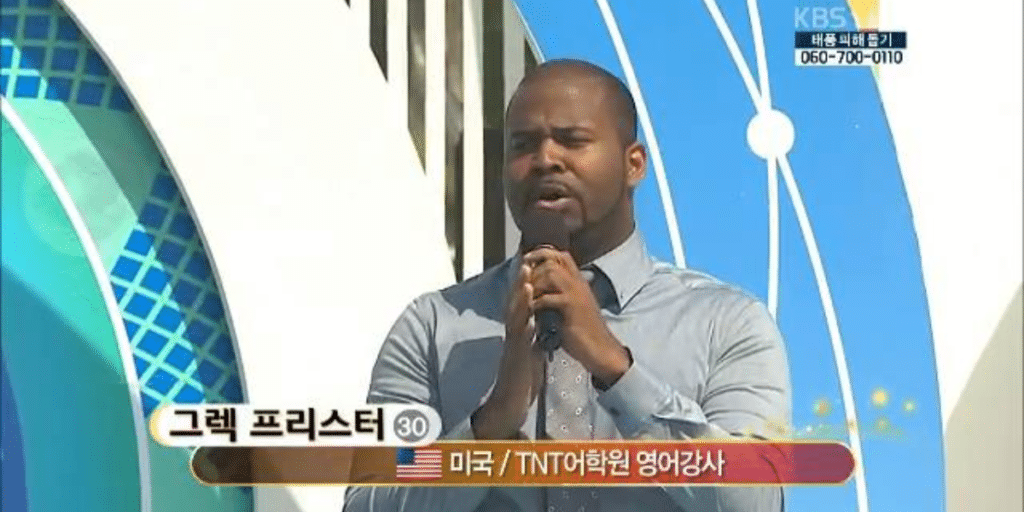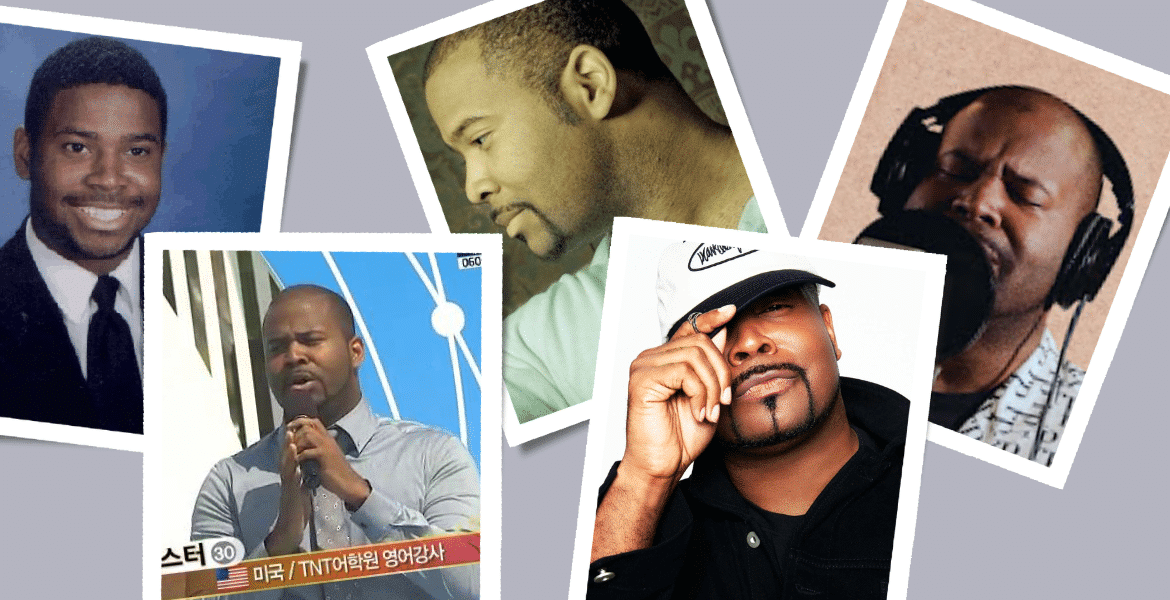When I met with Greg on an early Fall afternoon in the lobby of a downtown hotel for our interview, I imagined seeing us two in the lobby talking together looked to everyone else as if we were having a casual chat like any other two people catching up over the years. In a way we were as I first knew Greg back when he and I both attended Baylor School in Chattanooga, Tennessee nearly twenty years ago. At that time, we both played tuba alongside each other in our Baylor’s Upper School band. However, what I knew that passersby did not is that Greg is now a famous, verifiable celebrity – in Korea. Yes Greg rose to stardom in the land of Gangnam Style, BTS, and the Korean ‘cool’ wave of cinema and culture. Greg, my affable and modest, yet talented, schoolmate, had gone from being my tuba playing compatriot to a one-of-a-kind expat star on the rise. Today he regularly performs for thousands on TV shows and in live performances. Greg also guests on podcasts and radio shows hosted by some of the biggest names in the K-Pop industry, and he recently wrapped up his own radio show hosting gig. He’s also increasingly featured in K-Dramas, even before Squid Game took off in America.
Greg has undeniably been a part of a pivotal moment for Korean culture and music, and of course I had to ask him how this all began, and what started him on this path to stardom. Turns out it all started in a room familiar to he and I: a classroom.
Early Teaching Days in America
Greg recounted, “So I went to undergrad and triple majored: English Lit, Mathematics, and then Secondary Education. I initially went for teaching and I did my student teaching at primary level, where you teach everything, and it wasn’t my cup of tea. So I went back to focus on secondary education, which was actually easier as you focus on your major so [just] English and Math.”
Greg started teaching Secondary Education in a school in northern Indiana in the mid-2000s, not too far south of Chicago, and he remembered how the rise of school violence was just beginning to ramp up at the time.
“In modern times, schools regularly have stabbings or shootings, but back then it was just starting,” Greg recalled. “You would hear about it every now and then like with Columbine, but it really ramped up and I caught that wave right as I started teaching. We had violence left and right, and I would go home from work feeling miserable to be honest because it was depressing. Sometimes I would leave work and go home and cry because it was so depressing when you go to work and you’ve just spun your wheels the whole day and didn’t accomplish anything. That’s how it felt. And you’re teaching but you’re also helping the student fill out parole papers, and this one is trying to get custody of his younger siblings because his mom is on crack, and things like that. It was just so overwhelming. It was just so overwhelming with everyday violence, and dealing with everything but teaching, and that was the problem. That stressed me out and I had almost a breakdown. I hit burnout around my third or fourth year and decided to take a break.”
Move to Korea
Greg’s break from teaching wasn’t to last long, as he followed the advice of a friend who suggested he teach abroad for a year. He spoke with representatives from a variety of countries he was considering, but his interview with Korea won him over.
Greg said, “It’s been a seventeen year break now [from America]. It was supposed to be one year, but it worked out. It was a good fit for me.”
Though many Americans aspire to teach overseas, it’s not always a fit for everyone. Greg though credited the schools he attended for providing him the tools to do so. When I knew Greg at Baylor, he was a boarding student which meant he lived on-campus away from his South Carolina family and roots. This meant Greg had already dealt with what it’s like to live away from family on his own even before he went to college.
Greg remarked, “If I hadn’t been to Baylor and all my other schools, including Wabash, my undergrad, and Purdue, I don’t think I would have discovered [this opportunity to teach in Korea.] When I got over there I just felt really comfortable right away. Some people get homesick, and miss things, but I’ve never felt homesick in my 17 years. I miss my family, but not anything else. I have enjoyed my life in Korea.”
I mention to Greg it sounds like it’s just been a very natural fit.
Greg concurred with my assumption, and said “I feel very lucky because I don’t think most people go to another country and fit in so well. Sometimes I look back and think how did I manage to? Is it luck or is part of it my adaptability? I think I’m a pretty adaptable person, so if I went to China or Turkey or any other country I might have had a similar experience.”
I feel Greg’s good nature helps too, and in preparing for this interview, I watched many interviews conducted with Greg over in Korea and time and time again the hosts would mention how affable he is. I too mentioned recalling him as a gregarious guy at high school, and he riffed comedically, saying “There are people who say ‘Hey he’s a fake guy. He’s always smiling’.” Greg laughs and clarifies, “I don’t have time to be fake. This is who I really am.”
As Greg’s first year in Korea wrapped up, and he had to decide whether he would stay in his new home for another year or return after his one year contract expired, he began looking at the political landscape in America to help determine his path.
Greg thought back saying, “I remember the [school leaders in Korea] were asking me if I wanted to renew my contract, and it was 2008 and the politics in America were shifting. 2008 [and President Obama’s election] was historic, but it was also terrifying because it awakened voices we hadn’t heard and some ideas that we didn’t realize were so prevalent. I think that was probably a part of what made me say I’d stay in Korea.”
Greg also had to consider what Korea was like at the time, and he recalled, “It was a standard place to live. Not amazing but a cool place. K-Pop wasn’t popping off quite yet, but it was doing fine. So I wasn’t thinking wow this is the place to be, but I think what was going on at home made me say one more year. So I stayed.”
Greg’s time teaching in his early years was spent at the English Village, which has been considered a prime destination for expats looking to teach. However, many of the expats were insulated amongst themselves, and he didn’t immediately make many Korean friends outside of the staff.
“Most of my friends were American, South African, and British, but not as many in those days were Korean. The Korean teachers kind of stayed separate, and they would speak Korean amongst themselves. And the foreign teachers would speak English amongst ourselves. That’s kind of how it worked unfortunately, and only later in my time there did we start to bridge the gap. I remember after three or four years there were conversations occurring between all groups, and that ultimately led me to start singing at people’s weddings.”
Greg’s First Big Break
Greg’s first break, and ultimately the one that helped lead to his present career, was through his wedding singing. And that all began thanks to a company office party that took place at a cultural institution in Korea known as a noraebang, which is essentially a private karaoke room for any group looking to sing, drink, and even eat in the comfort of a private space.
Greg recalled, “We were having a hweshik, the company dinner, and we’d all eaten for our first round. Then we go to the second round where you eat again, and then for the third round you go to the noraebang. By then actually, I had been drinking. In those days, I was drinking, which I don’t now, but at the time I was drinking and I was just enjoying my night. We got to the singing room and they’re all just singing, and I’m already drunk and they say Greg if you don’t sing you have to pay. That was the option singing or paying the whole bill, so I say if I’m singing then load up a song. So they put on I think it was one of Joe Cocker’s songs. I can’t remember the exact song now, but it was one of those 60s or 70s ballads. I sang it and my score came up to 100 the first run. (Noraebang screens often have ratings out of 100 after each song). Those machines aren’t always accurate. Sometimes it’s about noise and sometimes it’s actually about accuracy. If you hit the notes accurately, it’ll give you a good score and I got 100. And they were like, ‘What is this? Greg, you told us you can’t sing?’ I replied, ‘I never said I couldn’t sing. I just don’t sing that much.’ I didn’t sing at that point, as I’d stopped singing many years ago. So yeah, I sang then and my friends were just like, ‘You’d never told us you could sing like that. You have got to sing at my wedding’. So suddenly, I got all these requests to sing at weddings, and that was when my life turned around.”
Greg then became a regular on the Korean wedding scene, as he received more and more requests from friends and others to sing at their weddings.
“I’m approaching 2,000 weddings now,” Greg remarked. “I started again after COVID calmed down a bit, so I’m at around 1,700 now. It’s so different now because back in those days, I would do them for free because I was just honored that someone would ask me. ‘You want me to sing at your wedding? Heck, yeah, I’ll do it!’ That’s how I got on TV. I met a TV producer at a wedding who said, ‘Why don’t you try our show?’ In my mind, I wasn’t planning on that. I love singing, but I never thought it’s something that I would make a career out of. So yeah that was another turning point.”
KBS National Singing Contest
Korea has a rich tapestry of singing shows, but one show dominates the cultural landscape and that’s the KBS National Singing Contest (Jeon-guk Noraejarang). This is the show that would ultimately lead to Greg’s big break.
Greg recalled, “Yeah I’d maybe done three or four other shows before the KBS’s National Singing Contest (전국노래자랑.) I had done another called Amazing Singer. Before that I did Global Super Idol at Global Supply. They were trying to make another idol group of our foreigners and Koreans mixed together. And I did another one before that, but the first three went terribly. Well maybe not terribly, but they weren’t a success. I was on them, but the shows weren’t that popular and no one really saw them. If you look up clips from them now you can’t find them. People are like ‘What show?’ Those shows disappeared. But then when I was on the National Singing Competition I woke up the next day and I couldn’t login to Facebook because it was so overwhelmed with messages. It was like, ‘You have too many messages.’ It was crazy, absolutely crazy.”
This was a turning point for Greg’s career, and this new push into the spotlight also provided more incentive for him to remain in Korea.
“That was in 2011 and I had been in Korea for four or five years at that point. I was preparing to go home by then. I had been thinking at the time that I’ve [spent] some good time here. I’ve healed and I’ve rested. I had been doing a few weddings here and there, and I wasn’t making money off of those at that time. It was just singing at friends’ weddings, so I didn’t see it as a future. The next elections were coming up in 2012, so I thought I’ll get ready to head back. That’s what I was planning on, and then boom! It was Chuseok, Korean Thanksgiving, [when it aired] and I remember trying to open my phone but it wouldn’t even let me scroll. It was an old iPhone and I tried to remove the notifications. I was like “How does this work?” I shut it off, then turned it back on, and then I waited for it to catch up and I started going through the messages. It was all ‘I love you!’ ‘You’re amazing!’ ‘Why don’t you sing more?’ ‘Where’s your album?’ ‘Do you have any music recorded?’ I couldn’t believe it! it was so surreal, and it’s still surreal. For me still though that wasn’t the moment where I’m like, “Ok I’m a singer. I didn’t say that for many years. Maybe almost four or five years later.”

Greg on KBS National Singing Contest
Greg attributes his success on the show to both his familiarity singing cover songs, and the rejection of his initial song choice for the competition.
“I was still singing wedding songs, and whatever people requested, and they could request anything. I’d say, ‘I don’t know it, but I’ll try it.’ Greg continued, “I’d watched a show called Naneun Gasuda (I’m A Singer), and I remember seeing Yim Jae-beom singing ‘For You’ and that’s why I sang it at the National Signing Competition. Trot is huge now, but back then people were like it’s only for older people. And I auditioned for that National Singing Competition with another song and they rejected it. They said, ‘It’s not fun or funny, and it won’t be interesting.’ So I was like fine, so I tried another song and I did ‘For You’ and I became popular from that. So I’m thankful that they rejected the other song, but it’s interesting to see now how music has shifted.”
Greg was gradually gaining success with singing contests, but he quickly realized he could take control of his burgeoning fandom and turn it into something by using social media and YouTube in particular.
“YouTube had only been a few years old by then, less than a decade old, so I said I have this [platform] and it’s good to post so people can see what I’m doing’, Greg noted. “Because people kept asking, ‘Do you have other videos?’ ‘Do you have other music we can digest?’ ‘Where is it?’ I was like I don’t have anything and I’m not a singer, and I thought how do I do this? So I said okay fine I’d just do YouTube, and at that time I would just record on my phone, practice, and I’d post those videos. Then I think someone from Epic High found it, maybe DJ Tukutz, and he found one of my practice videos. He was like, ‘Oh man, you don’t see Black guys singing Korean music like this. Check this guy out!’ And he shared it on his Twitter and my YouTube suddenly jumped. I had like 35,000 subscribers overnight, because that’s how Koreans are they’re like ‘trend, trend, trend’! That was the shift, and I was like ‘Okay, I think I’ve got the algorithm. I’m going to start posting videos of me singing Korean music.’ And I would record it on my phone, no mic, and I would just hold my phone in my hand and sing while looking down at the lyrics and people loved it. That’s how my YouTube started, and it grew from there. Then people started calling me for other shows.’
Greg’s career has never been a steady path towards success, and instead he’s been fortunate, and thankful, to get these series of high profile bumps along the way.
“I’ve taken a slow walk to fame versus overnight. I had some overnight success in a way because of the signing competition, but I think I’ve taken it slowly and it keeps me humbled because I didn’t say ‘Oh I’m the best! I’m BTS today!’, Greg chuckles. ‘Don’t get me wrong, they took a slow walk to it too. People don’t know, but many think it was overnight. I’m definitely not an overnight success. I’ve been doing this for over a decade, and so that’s kept me humble. And I’ve primarily done the covers to keep it fresh for listeners to hear Korean music in a different way.”
Greg realized there was a time when he wanted to push beyond just being a cover singer, and so he made a conscious decision to start on a path towards creating original songs.
“Once I was comfortable with [covers] I then said ‘Ok now I can try to make my own music.’ So that was 2014-2015 around when I released a single, but that was thanks to a fan. That wasn’t my own song. Her name is Jeon Jin (전진), and she reached out and said ‘I’ve got a song for you. I’m a huge fan. I’m a huge fan of yours, please sing my song’. I was like, ‘Really you’ve got it made?’ And she said, ‘Yeah I’ve got your guide and everything, so you’d just sing it.’ So I recorded that, changed it up a bit, changed a couple lyrics that were not quite what I would say, changed some of the melody to be more in my style, and then ‘Baby It’s You’ was the first song I released. That was the start of me making original music.”
Superstar K Season 6
While Greg was starting to work on original music, he was still competing in Korean music competition shows as well. Another one that brought him increased prominence was Superstar K. Greg competed in Superstar K Season 6 alongside the duo M.C.B TwinZ.
Greg recalled, “That was the next boom I guess. At the time it was the Korean version of American Idol. Everyone would go in their audition, and they do group competitions, group missions, and there’d be individual missions and battle team points. Winner and the top three would get a contract and the number one would be a famous singer forever, maybe.”
Superstar K really started to bring Greg into contact with popular Korean singers, as well as the next generation of Korean K-Pop stars, many of whom would be famous themselves.
“I was on with Kim Feel (김필), who is pretty famous these days. Kwak Jin-eon (곽진언) was on there. There were all these people who auditioned with me at the time, and it’s just so cool to look back and be like, ‘Oh that’s when it all started’. I remember being backstage helping them to calm down, because I was the old one. I was on KBS National Singing Contest when I was 29. By the time I was on Superstar K 6, I was 32, so I was pretty old considering these other auditioners were in their teens or early 20s. Then there’s me, the English teacher. I’m kind of old and that’s no problem to me. I’ve always thought age doesn’t matter, so if you want to go for your goals just do it. So I’ve never thought about age much. But yeah it’s pretty cool all these amazing people I’ve met over the years and continue to know.”
As Greg was establishing himself as a singer in Korea, K-Pop was beginning to breakthrough into the world’s consciousness thanks to Psy’s irreverent send-up of Gangnam. I was curious if Greg was aware of K-Pop’s growing foothold internationally at that time, and especially if he was conscious of Psy’s impact around the world in 2012.
Greg recalled, “I assumed it was just in Korea. I didn’t know it was a thing [outside of Korea] until I started seeing videos of people doing the dance globally. I just thought what is this? Because in Korean it wasn’t yet popular, but it had gone global and become popular, and then it came back to Korea and it was like ‘Oh!’. It’s the same with BTS. They were more popular globally before they were popular in Korea. People don’t realize that as well. Most would think they must be huge in Korea, but no they were very underground. Psy has been in Korea for decades, and everyone loves his music. It’s good music and it’s fun. He’s known as the fun older guy, but no one expected ‘Gangnam Style’ to be what it was because many people were actually angry with it in Korea. Get this everyone when they watched Gangnam Style, they did not like the parody of Gangnam. Gangnam is considered the rich, luxurious, high end part of Seoul, so if you talk trash about Gangnam, and the song is mocking this image of money, then Koreans were like ‘This song is funny, but it’s not that funny. Don’t mock your own people’. That was the reception, so it was funny to see it globally. Everyone’s doing the horse dance and then Koreans were like, ‘Excuse me?’ Then when it was famous they’re more like ‘Oh ok, nevermind, let’s dance too.’ You know? It’s like ‘This Is America’ by Childish Gambino. People in America were like ‘Excuse me what are you saying about America?’ Then it became popular worldwide too, and then people started doing the dance. I think it takes some pretty big balls to speak up about Korean culture, because that’s one of the things that can be frowned upon. Koreans love them when you’re with them, but if you’re against them you could be in trouble.
Greg’s Childish Gambino comparison made me think too of shows like Succession which skewers Western capitalist ideas, while back in Squid Game did likewise for Korean culture.
“Exactly,” Greg replied. “We need commentary on the status of society. I think it’s a good reminder because sometimes you’re just living in it and don’t think about it and don’t realize you have [these societal] situations.”
Greg Turns Down YG Entertainment
Psy at the time was signed to one of the major music labels in Korea called YG Entertainment Inc. Though Greg himself has continued to perform and record as an unsigned artist, he actually had a chance to sign for the same label.
“I work alongside a company now that’s an event company and they just plan my schedules and manage events. They don’t have anything to do with my music. That is totally up to me and what I want to do and when I want to do it. In the early days though, I was approached by YG. They asked me about a seven year contract. But seven years is so long, and nowadays you can get up to a three year contract, but back then it was a long contract. So at that time I’m in my mid- 30’s, and I’d have been 42 by the time I finished the contract. So I said, ‘I don’t think so’, and I rejected the contract. In retrospect, I probably could have done well with them if I had done that.
Greg elaborated on the pros and cons of signing with a label such as YG Entertainment, saying “I think it would have been nice to have the brand power, but when you look at K-Pop the groups are the products and then the companies push those products. Their PR teams are just so good at marketing, managing, and helping them go viral. In my case I just release music and hope people still listen to it. There’s no push. There’s not much marketing or anything. It’s just me uploading it and hoping that people like it.”
Greg also contemplated how signing to a label such as YG Entertainment would have thrust him to insane levels of fame in Korea, and how that might affect his life for better and for worse.
“I don’t know that I want to be more famous,“ Greg remarked. “So everytime my follower account grows a bit, I get a little nervous because I don’t want to be boxed in by the fans. Whereas I know many K-Pop groups are under the thumb of their fandoms. You know ARMY I love y’all to death, but I think BTS has quieted down a lot because of how things are pushed on them. There’s something that happens where everyone’s like ‘BTS you must do this!’, but [BTS] might be like actually we have no opinion on this. But the fandom speaks for them in a way, so it can be a little scary. I’m kind of thankful that my fandom is big but not too big. I can kind of keep it under control and say ‘Guys calm down’ or I can post a note saying ‘Don’t do that.’ BTS can’t. Their fandoms are so huge they just have to ride the wave with them until they calm down. That’s why Beyonce doesn’t interact with the Beehive much. She knows they’re out there, but she doesn’t say much because she doesn’t want to be tied to it. I get that, so now I see that and I’m like ‘Ahhh that’s smart!’. So she just leaves them as a separate entity. She knows they’re there, she thanks them, and she leaves it there. I’m like okay that’s kind of smart.”
Upcoming Album and Touring Plans
Greg’s been working on original music for his fans, and as such I was curious if he had plans to start touring and asked if one day we’d see a tour the size of Beyonce’s or Taylor Swift’s Eras tour.
“I’m hoping to start touring next year. My full album will be out by spring, because I’ve been releasing a single per month over the last few months. So by next year the full album will be released, and we’ll compile all the singles back together and have my first full album. From there I plan to start touring. I don’t know if it’ll be the scale of Eras,” Greg says with laughter. “But hopefully one day you will see me touring on a grand scale because I’ve found I have fans in South America and Europe. I get messages sometimes in Arabic on my page, and I’m like ‘What, I have fans in the Middle East?’ I’m humbled every day, because I didn’t plan for any of this. In my dreams this is beyond what I would have expected. So if I tour someday I’ll already be doing more than I ever planned, and if it happens that’s great. So hopefully in the next year 2024 you will be able to see Greg’s concert tour.”
Greg’s forthcoming album, as well as each of his single drops, will be released with two versions for English speakers and Korean speakers.
Greg mentioned, “We’ve got every song translated into Korean, so I have all the songs in English and another version where all the songs are in Korean. That wasn’t my original plan, but my company thought it’d be nice to have two versions. I thought some songs don’t translate, and it’s really difficult to get that same vibe in the other language sometimes, but they’ve been really adamant we should try each time there’s a single released to release an English and Korean version as well. So we try to see which one people gravitate towards more, and every time it’s mixed. Sometimes they like the Korean version more, sometimes they like the English version more, so I thought maybe I should just do a K-Pop style where the chorus is Korean and the verse is English and then everyone can sing along.”
Since Korea’s such a distinct music market, and Greg’s such a unique presence in their music landscape, Greg feels that marketing his music can be a bit difficult.
Greg remarked, “It’s tricky. Even just until this year my songs would always be released as a 외래의 artist, which means a foreign artist even though I’m living in Korea. So that’s tricky. For example, I released a purely Korean song, but it was on the foreign list. This is upsetting because then BTS releases ‘Dynamite’, and it will go up on the pop list and how the heck does that work? They’re Korean. They’re a Korean group releasing this song, so it should be under the K-Pop list but they will put it under Pop. So does it work on language, because if that’s the case my song is purely Korean but you put it on the Pop list? So it’s been a bit messed up.
Greg’s done his best within this landscape to push how he feels his music should be categorized on the charts in Korea.
“I really complained about that maybe three years back, right before COVID, and I said when I release music please put it under my name and then I’ll tell you the genre and that will help,” Greg explained. “So if I say it’s Pop then it’s Pop, and if I say it’s K-Pop then put it under local because it’s K-Pop in that it’s Korean Pop. It’s becoming easier now because they’ve combined the lists so now Korean songs just come up under Pop. Some people don’t like that because they feel the domestic Korean groups get lost down the list, because it’s mixed in with Shawn Mendes and Ed Sheeran, and they’re like ‘How can we compete with them?.’ But you’re the local acts so people love you too so chill out. It’s worked out because IU was on top of all of the charts. There was a trot singer Lim Young-woong, and he was top 10 and shined over Beyonce. I was really shocked. I was like, excuse me, because you know I love Beyonce, but it’s cool to see the process. Making music in Korea is different, because there aren’t many foreigners over in Korea who are singing. If they are singing they are mostly doing covers on TV programs, similar to what I used to do. But then releasing original music that’s really complicated, because it’s like where does it fit? He’s foreign living in Korea making music. So is he a Korean artist? An American artist? That’s hard to classify.”
Korea does have a tradition of expanding the global reach of their K-Pop groups by incorporating singers from other countries in K-Pop groups, as demonstrated by the inclusion of Chinese singers Fei and Jia who were in Miss A, Nichkhun of 2PM who is a Thai American, and more recently Danielle of NewJeans who is Australian born. That’s just a small sample too, but I asked Greg if those efforts impact his inclusion into the Korean music scene any.
Greg replied, “I guess it’s a little outside of my realm, because I’m not doing K-Pop. If I do sing a K-Pop song I’m doing it soulfully or like an R&B style, so when they hear mine, they’re like ‘Hmmmm… there’s no R&B genre.’ and so they may [define it as a] ballad. That exists. So they look at me a little sideways and say ‘We don’t know Greg, where do we put you?’, and that’s one of the difficulties of what I do. It is trying to find where I fit in. So I’ve just stayed on my path and kept making music, and those who love it will find it. I’ve resolved myself that if they want to hear it they’ll find it. So that’s about all I can do now. Until there are more foreigners making original music in Korea, it would be easier but there aren’t so I just have to keep on trailblazing until other people get on the path and start doing the same thing.”
Paving a Path to Success in Korea
Knowing there will be many others from around the world who may aspire to follow Greg’s success, I asked what he would suggest to anyone looking to breakout as a foreign singer in Korea.
“The most I could say is that in Korea the SNS and social media presence is super important, so the more that you’re visible online I think the better chance you have of making there. Learn Korean,” Greg emphasized. “If you want Koreans to listen to you then you have to speak Korean or sing some Korean. Even if you butcher it, they will listen to it. They don’t care. They’ll say, “At least you tried.” If you say ‘Annyeonghaseyo’ they’ll say ‘Your Korean is good.’ They’ll go nuts even if you just say the tiniest bit, so embrace the culture, embrace the language, and they’ll give you a chance. I’m sure anyone could walk up behind me and do the same vibe that I’ve done and start singing in Korea and I think have a relative amount of success because there’s not many out there doing it. So if someone tries to do it, they’ll be like ‘Ok we give you credit for that.’ If you’re a great singer and you do it you probably will be a top star in Korea. There’s one girl Maria on one of the Trot shows, and they love her in Korea. She hasn’t released any original music, but she does sing cover songs a lot and has millions of views. People are in love with her proficiency in Korean and the way she sings, and so I look at her and go ‘See I paved the way’. You have a chance. so I say just go for it”.
Greg’s success has helped pave the way for foreign artists coming up in Korea; however, he’s still not as well known in his birth country of America. Though that could be changing as more interviews such as this one are putting a spotlight on Greg’s career.
Greg remarked, “Stateside I don’t think that people know much about me. I tell them, ‘Oh I’m a singer in South Korea’, and they go ‘Whatever.’ Then they’ll check my YouTube, and say ‘Oh gosh you have half a million subscribers! What is this?’ You know they’ll say stuff like that. I do hope that more people in the United States start to recognize that they have an American doing great things in South Korea.”
Greg’s family hadn’t had the chance to fully experience his newfound celebrity, but on a trip to Atlanta his mother got a taste of what it’s like to have a famous son.
“I took my mom to Korea Town in Atlanta to grab lunch, and we got into the restaurant and the woman in the kitchen just screams. My mom’s terrified, and she’s like ‘Oh my we’ve got to get out of here, she thinks we’re robbers!’ and I’m like ‘No no, calm down, she knows me’. And she comes up and is like ‘You’re Greg? My son is a big fan of you!’ and so she gets on the phone and she’s trying to video in her son, and saying ‘Look son!’ My Mom was so amazed.”
From Singer to K-Drama Star
Though Greg’s primarily known for his singing in Korea, he’s starting to make a name for himself as an actor as well. One incredible opportunity that arose for Greg was the chance to audition for Squid Game.
Greg recounts, “I auditioned for Squid Game. I didn’t get cast of course, but the part I was reading for was Abdul Ali. He’s a Southeast Asian character who was working in a factory. I was so sad they had me read for that part because it said the character is from Pakistan and I don’t look like anyone from Pakistan. I said, ‘Are you serious?’ and they were like, ‘It’s ok. Just read for it. Don’t worry.’ I read the part and I did my best, but at the audition there was this room of all these Southeastern Asian looking guys coming in the room, and I was so embarrassed because I thought they could cast better than me. So I didn’t get it, but I would have loved to be on it. So if Squid Game 2 is coming up, hit me up!”
Though K-Pop is what Korea’s most known for still, K-Dramas have become a mainstay on Netflix and other streaming sites as well even before the dual Actors/Writers strike. Greg mentioned even many of the shows created in America have Korean roots.
“[There’s] so much talent in Korea I think that goes unnoticed to some degree, and people know about it but they’re like K-Pop, K-Drama, K-Movies, etc. But there are some really good plots [and shows] I think people don’t even realize come from Korea,” Greg said. “Masked Singer came from Hidden Singer. The Good Doctor was originally a Korean show. I think people don’t even realize that and they see the American version and go ‘Wow it’s such a good show!’ I’m like, ‘Yeah it started in Korea’. There’s so many shows like that.”
Korea’s really been the center of the cultural zeitgeist for the better part of the last 10 years, and Greg’s very aware of his fortune to live in Korea during this moment.
Greg said, “I’m honored that I’m living where I’m living and [that I’m] having the chance to experience what I’m experiencing in Korea. I’ve said over the years it’s been really cool to see all the stuff that people just probably wouldn’t get. I can explain stuff to them all day and they’re like, ‘But it’s in Korea’, and I reply ‘Yeah but it’s going to come to America eventually.’ So right now everything is big in Korea, and I bet you within a year or two some American company will buy the rights to use that same show and sure enough it happened with the Masked Singer. I was on that right before the American version came out. I just thought it was so funny when it came out in America, and people were like, ‘Oh this new program is going to be so cool!’ Those big masks [on the show] have been out in Korea for over a decade.’
In addition to starring in Hidden Singer, and increasingly guesting in more roles and featuring in commercials, Greg received another shot at a drama that would really stretch his acting chops.
“Around the same time I auditioned for Squid Game”, Greg recalled, “I’d been called for an audition for Gong-Mu-Won Na-Dae-Gi. They said, “Oh we know you’re interested in acting, so if you really are then read for this and we’d be honored to check out your audition.’ So I did it and I read for a very small part. I wanted a tiny roll in the back of the office, someone who is shy and quiet, and I didn’t want to say anything. Then they say ‘You’re the main lead role!’ [in our Jeju based show]. [Jeju is an island in Korea with a distinct culture and heritage.] Jeju speaks a different version of Korean. It’s not even an accent that’s different. There’s Busan dialect where the endings are different, but Jeju is like a totally different language. Koreans don’t always know what you’re saying. This is a different set of words, and it’s tough to make sense of it. So my friend laughs and says ‘You got cast for a drama speaking Jejun? Oh you’re gonna work. I don’t even know what they are saying, and I’m a natural born Korean.’ Oh my goodness. I was glad I got cast for it, and it was a good chance to work on my acting because I haven’t really done much. I did a few musicals back in the day, like community theater, but this was the first formal acting I’d done in front of a camera. And it was difficult, and honestly I wasn’t prepared for it. I wanted to be good at it, but the language study each week, and getting the script every week because you’re filming a new episode every week, was overwhelming. But it was a good overwhelming and it was a good challenge and I’m thankful for it. I’d do it again, and I hope in my career I’ll have more chances to act. I think it’s cool to try as many new things as you can, and even at my age where people say ‘Oh it’s too late to be trying new stuff’. I don’t believe that, and I’m going to keep trying new things regardless.”
Unlike many television programs throughout the world, Korean television shows are shot as they air, which presented an especially difficult challenge for Greg to get adjust to.
Greg explained, “They are making new scripts sometimes the night before. So you’ll have studied the script that they sent you a few days before, but then they’d change it saying we have something coming up in the next episode. So I studied the script, and I don’t speak this at all, but the cast was all Jeju people. A few were from southern ports of Korea, like Busan, so everyone had kind of a grasp of Jeju language. But I tried my best, and they were very supportive, and would say ‘You’re doing fine’ and ‘Don’t worry’ but deep down I knew I was the weakest link in there.’ But they always cheered me on and said you’re doing great. So it was a good opportunity.”
Men On Air
In addition to entering the world of acting, Greg also began a new journey in 2017 as a radio host on the program TBS eFM <Men on Air> (맨온에어).
Greg mentioned, “It’s been a long time, about seven years [that I hosted the radio show]. It’s been fun. We actually stopped earlier this year, due to budget and [the world of] radio is difficult right now. People are wondering what will happen with broadcast radio, as a lot of folks aren’t making it anymore. But the years I hosted from 2017 on were amazing. I did it everyday, and it did make it hard to travel, so it’s kind of nice having a break. I can take some vacations, and that’s why I can take this vacation [to the U.S.] for a longer time. But it has been cool. The medium is [just] difficult now as everyone has their own playlists, and they get in their car plug their devices in, and they just don’t think of radio anymore. It’s kind of sad to see it going away, but what else can you do? So many of those radio stations have tried to adapt and make it what they call audio viewable radio or video radio so they can keep it alive, but even that’s difficult. People are like, ‘I can listen to what I want when I want, and I can just turn on a podcast.” It’s kind of weird how life and times are changing so much.’
To me it sounded like Greg was then in a transitory phase, and so I asked what it’s been like pivoting in new directions.
Greg replied, “This forced me to [refocus] actually, because at first I was like radio is a good place to sit for a while and chill. Then when it slowed down I was like ‘Oh I better get back to work.’ So it got me out of my comfort zone. I think I had gotten pretty comfy knowing I could take a break and do radio and sing sometimes and perform sometimes. Nowadays I’m figuring it out and getting back into music again, so yeah it’s a good thing. It’s a blessing in disguise.”
Greg’s break allowed him to refocus on his music, which is why he’s able to work on his new album and the singles he’s releasing on YouTube. I asked Greg to elaborate on the creation of the album and what that process has been like.
Behind the Music
“It’s different,” Greg mentioned. “It’s not my usual stuff, so people are like ‘What’s this?’ That’s right I don’t sing the same way every time. This whole album altogether will have just about every genre on there. It’s 12 tracks all together and I’m covering country, folk, R&B, soul, there’s a little bit of gospel, and even some rock. There’s also a Christmas track coming up soon, so it’s all over the place. The problem is I’m really indecisive when it comes to music. So when we sat down with the studio, and they’re asking about what kind of music do I want to make I said, ‘All of it.’ They asked, ‘Can you focus to one [genre] this time? And I was like ‘No…can we make all of it? Then eventually I’ll focus, so let me see what people react to and then I’ll go in that direction.’ And that’s what we have been doing. I’m thankful for that. I just wanted to do something that was out of the norm for me, because everyone always hears me sing soulfully doing R&B with the same mid-tempo. This time I wanted to slow it down and sing something softly. I rarely get to just use my falsetto in a calm way, as I’m always belting these high power notes. But it’s nice to tone it down a bit and softly get those notes out..
Greg continued, “I was just honored that when I recorded the first take the studio was all like, ‘Yeah that’s good.’ I said, ‘The first take?’ I thought I must have made some mistakes and that they were worried, but no they said take the first take. I was like well let’s do it again, because we have to record it at least three times just in case there’s some weird part we needed to cut. That’s just how we record nowadays, but in the 1960s or 1970s you would record the song straight through and that was it. You couldn’t go and cut it because there was a whole process that was too difficult. So I admire Aretha Franklin and Sam Cooke and the older veterans and all those singers from past times who had to go in and sing the whole four or five minute song straight through with ad libs and all from the beginning to finish like a live track. I just think that’s amazing. If I could do that, I’d be so proud of myself. I tried to do them in one take, and said if we can’t keep all of it I have to do it again. The studio folks would say, ‘Are you serious?’, and I say ‘Yeah dump it if we can’t keep it all.’ I don’t like these cuts. The technology is awesome and that’s fine, but I want to be able to say that I could sing the song straight through without much worry. I’m thankful for that.
At the time of our interview, Greg had recently released his latest single, ‘The Initial’, and I asked him to explain what was the impetus behind the track.
Greg mentioned, “So ‘The Initial’ is about what’s important to me. Going back to COVID it was difficult to find oneself. I know everyone was alone, or stuck and doing remote access, learning, study, work and all of that [from home], and it was hard. You couldn’t connect with people. So I thought ok what’s most important? What’s ‘The Intial’? That’s you! You’re ‘The Initial’. So in the lyrics I think ‘The Initial’ is love, peace, those things inside of you, and not amongst others. When you have peace and love inside of yourself, then you can make it with other people. I believe that 100%. So when I wrote the song, those lyrics were in my heart and that’s what I wanted to say.
Fandom Across the World
One element Greg is especially excited about with his new music is performing it in front of fans, especially as COVID limited the opportunity for live performances.
Greg said, “That’s the best for me when I can interact with fans. That’s exactly what I should be doing, and for a long time I was shy about that. I’d think about getting on stage and going ‘Ok what do I do from here, what do I say, how do I introduce myself?’ Now I feel this is where I’m supposed to be, and I love those interactions over everything. I love that over any performance. With TV, Movies, and YouTube, all of that is great, but the live performances…that’s where I want to be!” Right before COVID kicked up I was about to start doing regular live shows. Not quite a tour but almost with live performances every other week. Then COVID hit and all of that was canceled. But I did two of them before COVID, and so I had a fan meeting in October 2019 and then I started the lives [performances] right away.
This fan meeting would leave a lasting impact on Greg, thanks to an incredible counter he had with some fans who made the long journey to see him.
View this post on Instagram
Greg remarked, “I had one show in Seoul and some people had come all the way from Osaka in Japan. You have to fly or hop on a boat to get to Korea [from Osaka]. They are Koreans living in Osaka, but they still came from another country just for this small one hour show that I was doing. I said [to them], ‘You came all the way for this performance?’ They said ‘Yes we’re such big fans of yours. We’ve loved you since the Korean Singing Contest’. I was a mess. It just broke me to pieces. If I was a wall holding water I just shattered and started leaking everywhere. I asked them what’s your favorite song, and they didn’t say a cover. They said ‘We love Baby It’s You’. Like if you want to break Greg call out one of my songs versus Bogoshipda (“I Miss You”). Everyone knows Bogoshipda (“I Miss You”) and that I covered it fine, but when you call out one of my original songs that’s when I say, ‘Wow yeah that’s a real fan’. That’s amazing to me too, because I didn’t think that people had listened to my original music yet as much as my covers. And I get that. It’s why I’m working on more original music to out do the covers, but when someone asks for one without me pushing it that’s the moment for me. I’m honored that I have fans every day. Near, far, America, Korea, anywhere they exist I’m just very honored every day even now. Fifteen years in and I’m still amazed and so appreciative. And that moment seeing them willing to fly, and after they’ve spent money to travel here, to come to this tiny show was so cool to me.
I asked Greg if these were the kinds of moments he’d share with his family back home.
Greg said, “Oh yeah I told my mom about that. She said, ‘Oh they know your songs?’ And then she said, ‘I know your songs.’” Greg laughed, and he said “‘Well I know you know them Mom.’ She’ll sing along. She doesn’t speak a word of Korean, but she still knows the melody. She’ll say, ‘I heard that song you sang the other day with Soo-young.’ That’s really nice. She’s followed all of these years regardless of the language, and her and my grandma will be watching my YouTube and say, ‘You sang that song really well. I don’t know what you sang, but you sounded really good.’ They support [me] and that’s special.”
Greg’s been increasingly recognized by his peers as well in the Korean music industry, and as such I asked if he’s had the opportunity to either guest alongside other artists or to be pulled up on stage at a live show as a special guest.
Greg confirmed, ‘A few times. I’m usually a guest toward the end of the year with a lot of Christmas shows. I’ve contracted a few already for this year, but I’m not supposed to say. I’ve got a few really big shows though with a gigantic audience at a stadium. It’s terrifying because by the end you don’t even hear anything. You have your ear pack, but it’s all so loud and with the echo you just hope you’re singing it right. So yeah that’s on a different level. So I’m adjusting to singing on big stages like that. I’ve gotta work, so I can’t say no, but I just have to get up there and figure it out. I do have stage fright and big stages like that can make me nervous, but I get through it.”
The Next Generation
As Greg’s increasingly become a veteran in the Korean music industry, I asked if there are any talented, aspiring singers who haven’t yet found breakout success that he’s really excited about.
“Gosh, there’s so many,” Greg said. “The problem in Korea is that there’s so many talented singers. Even [lesser] known singers. You’ll just walk by a small street corner, and there’s someone busking there and they sound absolutely amazing. You’ll be like, ‘What is this?’ Sometimes I’ve seen that and I’m just floored because I’m like, ‘You sound better than me on my best day! Why don’t you have a recording contract?’ There’s so many people the market it is flooded. I just don’t have a chance. So there’s one guy I listen to who is slightly well known, but I think he should be more well known and his name is G Soul. He’s so good! He’s one of the most soulful singers I’ve met in Korea. He’s really, really good. His runs [consecutive notes sung in rapid succession up or down a scale] are really precise and something that I’ve not heard from a lot of Korean singers. I just think he’s so good but so underrated. Why don’t people know him? I’m angry for him, because I’m a huge fan. Luckily his fandom is growing because they support his music.”
Greg continued, “I think a lot of what it takes to make it is timing and luck. You can be super talented but just not have the right timing. Some people may say ‘Why are BTS so famous?’. They’re talented yes, but it’s also timing and luck. It can be meeting the right person at the right time. There are so many things that have to fall into place for someone to become famous, and I think that’s what it all comes down to. So I say stick with it. You may not be famous right away, but if you grind and stay on the grind it builds. I’ve been blessed to see my career go that way. So when I see G Soul I tell him stay on it. You know if you really love it keep going with it. He’s like, “Yeah I’m trying.” That’s it all takes. Just keep going and you’ll get there eventually.”
You can follow Greg across various social media platforms, including YouTube, TikTok, Twitter and Instagram.
Since our conversation, Greg has released his single “Nostalgia Man,” which you can hear below.










